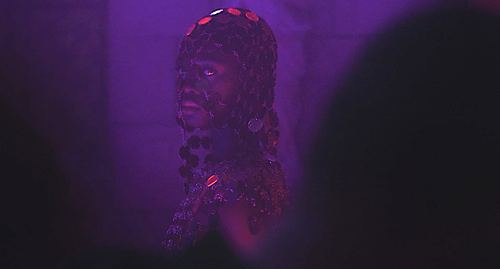By Robert St. Martin
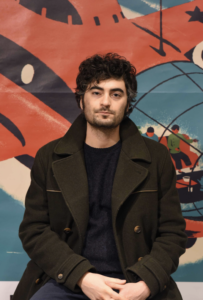
Los Angeles CA (The Hollywood Times) 2/10/24 – Currently playing at several Laemmle Theatres in Los Angeles is Giacomo Abbruzzese’s debut feature film Disco Boy (Italy/France, 2023). Disco Boy is a daring, hypnotic film that takes the audience on a harrowing, dream-like journey with actor Franz Rogowski playing a Belarusian in search of a better, more free life in France. The film’s visuals are quite impressionistic and dreamy, every outdoor scene is nicely shot by cinematographer Hélène Louvart, who received an award at the Berlin Film Festival for her work and innovative use of night vision, with heat signatures as the only light source in a key night-set fight scene in the jungle.
The film begins as a bus full of football-loving tourists reach the border of Belarus and Poland. In this bus are Aleksei (Franz Rogowski) and Mikhail (Michał Balicki), who have their hearts set on going to Paris, despite their Schengen visas only being valid for a three-day trip. Things get rough quickly as an incident causes Franz’s Aleksei to go at it alone, eventually reaching Paris. Here, he enlists in the French Foreign Legion, a faction within the French national army composed of foreigners, many of whom illegally reached France. With the promise of a French passport after multiple years of service, Aleksei becomes deeply involved in training. He shows promise as a formidable fighter and thus is picked for a covert hostage rescue mission overseas in Nigeria.
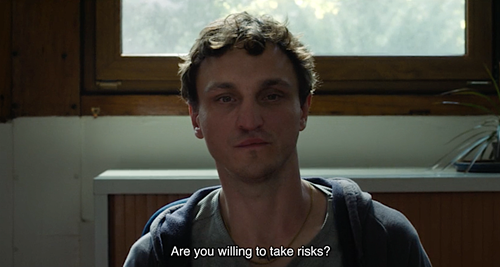
The part of Nigeria that Aleksei and his team arrive at is controlled by the Movement for the Emancipation of the Niger Delta, abbreviated as MEND, a rebellious anti-government group who want to reclaim the Nigerian delta from petroleum companies. Here, the audience is introduced to the leader of MEND called Jomo, (Morr Ndiaye), his sister Oduka (Laetitia Ky) and their village. But it isn’t long before they are met with resistance due to the French captives they take. Somehow this results in Aleksei being deployed to Nigeria. What ensues is a story told from both of the main characters’ perspectives until the moment that they cross paths.
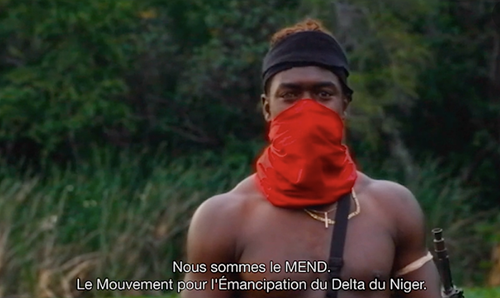
The circumstances of the film make one question the film’s title, Disco Boy, and its true meaning. A story about a French Foreign Legion soldier in Nigeria, at face value, does not spark any connection to disco, or music in general but more like the mood of Claire Denis’ Beau Travail (1991). But by establishing the MEND side of the story, dancing and music become a vital part of the film. Abbruzzese’s title is a little on-the-nose but makes complete sense given a specific character’s wanting to be a nightclub dancer and the beguiling link between the two protagonists. Rogowski, a riveting actor in Great Freedom (2021) and Ira Sachs’ Passages (2023) as well as Christian Petzold’s Undine (2020), has an enchanting presence in Disco Boy that undoubtedly elevates Abbruzzese’s film.
Abbruzzese heavily relies on ambiguity, so all meaning is derived from facial expressions and visual imagery rather than dialogue. Out of thin air on one boozy night, one of the MEND villagers appears as a dancer in the nightclub that Aleksei frequents. The initial shot makes for a striking dream-like visual. But nothing is explained, we are left questioning the reality of the encounter. This reliance on ambiguity can is intriguing to those watching the film. Franz Rogowski commands audience attention through his ever-mysterious looks and delicate movements, which contrast his outer persona as a soldier.
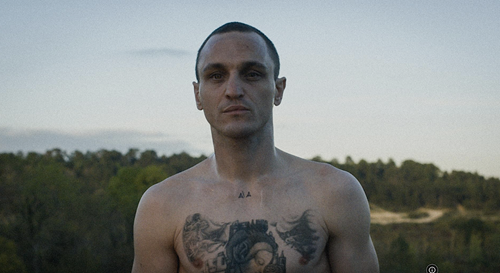
Ndiaye has very little screen time compared to Rogowski, but his aura lingers on as Aleksei is haunted by his time near the Niger Delta and their brief but impactful encounter. As you will see, the curious tiger eyes of Jomo and his sister Udoka have a magical and lasting effect on Aleksei, who begins to see as if the eyes were open wounds.
Abbruzzese allows Rogowski’s presence to fill up the frame, emptying out the screen of distracting elements that would, in almost any other film, craft the atmosphere of an all-functioning world. In the spectral world of the film, each scenic element gains symbolic status, evoking the profundity of surfaces in dreamscapes. Aleksei’s jacket is made of leather – hard, matte, and pointedly creaking like machinery as he walks through a nightclub. There, he orders two glasses of Bordeaux, silently toasting the dead Mikhail, before encountering a woman (also played by Ky) who suggests a projection of Udoka, who he never met in the Niger Delta. Wearing a sequined dress on the dance floor, she casts a spell on him so well cast that he doesn’t stand a chance.
The meeting and experiences of Alexsei as a French Foreign Legionnaire and Jomo as the leader of a Nigerian rebel group never connect thematically in a fully cohesive way. Their clash is integral to the plot and allows Disco Boy to morph from stylish intrigue into a painful portrait of trauma. Aleksei’s experiences as a soldier start to break him mentally, exacerbating his already present feelings of otherness. As in Beau Travail, Disco Boy shines a harsh spotlight on the French Foreign Legion and war in general; the colonialist tropes and wasted lives smack you in the face with full force. Aleksei, like so many of the other soldiers, becomes less of a human as the Legion absorbs him. Abbruzzese is keen to highlight the irony in the fact that the institution that is meant to help Aleksei is just stripping him of his very sanity.
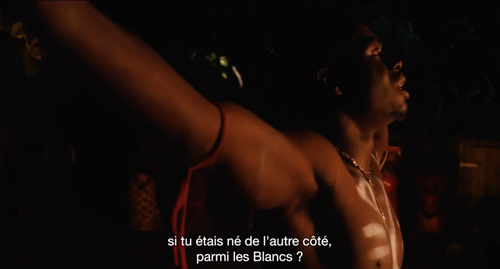
There is a haunting, elegiac quality to the way Disco Boy is formed, reflective of the worsening melancholia that Aleksei feels. As Aleksei searches for the utopia, he once dreamed of in France with Mikhail, disco proves to be that one shining light for him, with its trippy lights, thundering beats, and the freedom of movement. Similarly, Jomo’s own relationship with his sister Udoka (Laëtitia Ky) is built on the connective power of disco. This driving force, bolstered by a sublime original score by Vitalic, offers some form of hope for the interconnected characters. The final scene of Disco Boy is a fascinating commentary on the unforgettable solo disco dance of Denis Lavant in Claire Denis’ Beau Travail as Aleksei seems to finally enter the heart of darkness and cast aside all promise of a utopian life in France.
